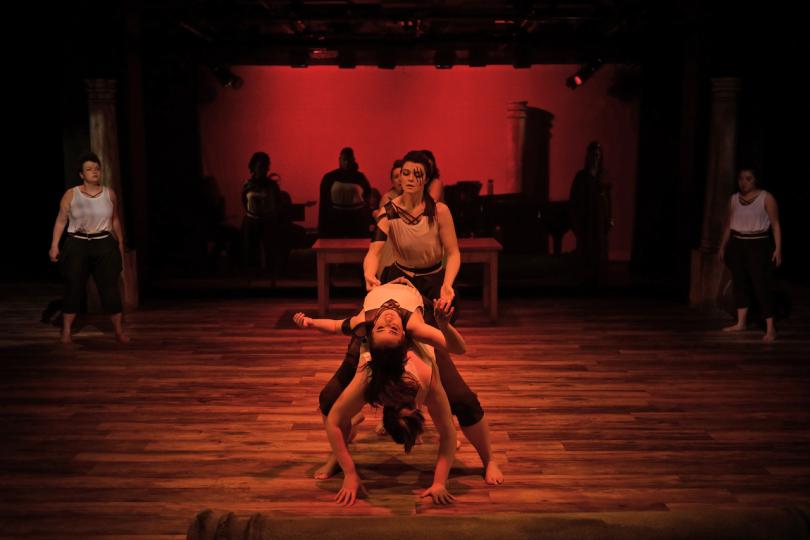Un-Buried Child

Most stories are about the heroes; their trials, their tribulations, their successes, their failures, and even their enemies. But what about the regular people? The witnesses? Those nameless faces who are forgotten amidst the madness? The opening of Park Square Theatre’scurrent reboot of a 2016 devised production of Antigone, poses these questions. The character of ISMENE (Jamilia Joiner) bears witness and asks the audience to take a moment and think about those people, the little people of their/our generations. How do they contribute and how are their lives ultimately affected?
In an interview with Antigone director, Meagan Kedrowski, (conducted by Marcia Aubineau), Kedrowski says. I’ve always been drawn to classic Greek theatre. The dramatic stakes are so high, and the lessons are so rooted in the human experience...for this version of Antigone, we create an original, devised adaptation of the classic Greek drama but continue to explore themes of civil disobedience, fidelity, and family love. We face head-on the ever-changing and difficult debate: which law is greater— gods’ or humans’? The play also holds up a mirror to what a loving family torn apart by power, greed, and humility can look like. In addition, in a time when natural law and contemporary legal institutions so often overrun our personal fights for justice, we ask the question: For what would you be willing to die?”
Antigone, is a Greek tragedy written by Sophocles, in or before, 441 BC. It’s tough to fathom that a story conceived of over 2500 years ago can still be relevant. Trust me, this group of women prove just that. Kedrowski purposefully leaves in textual references to how undermined women were at the time period, (i.e.“we can’t go against men who make laws).” It’s somehow appropriate to have this play, about a strong young woman standing up to her uncle, to protect her brother’s spirit in the afterlife by going above the law of the land and, instead, honoring the will of the Gods, performed by ONLY women. Talk about addressing civil disobedience. It makes a statement in the wake of our current political climate and continued pursuit of equality, and it absolutely works.
Themes, loyalty and family values, are presented front and center without apology. Every character thinks they’re doing the right thing for the right reason and refuses to entertain a possibility of the other side. Sound familiar? The cast is therefore tasked with the job of keeping the various points of view clear and they rise to the occasion. They are grounded, committed and full of energy. Highlights include a stellar rendition of reluctant villain, KING CREON, played with equal self-confidence and familial warmth by Laura Leffler, and an empathetic portrayal of his son HAEMON by Vinecia Coleman. They accept their roles as the main stage men with grace, sensitivity and don’t put “ON” inherent male stereotypes or generalizations which often muddy gender bended casting. Thoughtful and heartfelt moments between sisters ANTIGONE (Lauren Diesch), and ISMENE (Joiner) balance out the early conflicts between their wild brothers ETEOCLES (Kelly Nelson), and the younger POLYNEICES (Perez). Comic relief is maintained in the antics of the King’s guards, specifically the scene where a bumbling GUARD (Meredith Kind) has to confess to CREON (Leffler), that the body of traitor POLYNEICES has been moved. This is the much-needed levity in the original script, and these talented women nail it and then some. Kudos to both as the “hemming and hawing” and dancing around the actual point, made me laugh out loud.
The modernization of the ancient language works remarkably well. Though contemporary and sometimes colloquial, it stays clear, simple and honest to the original story. The trouble with taking on relics like this, is if you speak the original text it can overwhelm and intimidate an audience that isn’t used to the sound of said language, and the story can be buried. On the other hand, if it’s presented to “in the now,” it can undermine the weight of an ancient archetype and can lose the magic of the story telling. Kedrowski and crew finds the necessary balance, simplifies the text while maintaining heightened reality, the mystery of passing time and the power of the Gods. With the addition of live music, and creative choreography, they bring a potentially stagnant and antiquated story to new life. Another strong choice to put the action ON the stage (when it’s traditionally left off in classic Greek text) is effective. Done with smooth movement, lighting and sound, it keeps these brutal scenes representative and artistic, and never pushes the vulgar envelope and the story goes effortlessly back and forth between the present day of a ravaged city and feuding family, to older better days that were softer, and safer.
The script notes describe this production as being created using “Devised Theatre: A method of theatre-making in which the script is created collaboratively by the performing ensemble.”
To be completely transparent I don’t have any real background in devised theatre, nor do I always find it successful. However, this modern devised adaptation is poignant, timely and entertaining. I think because there was a true reverence and respect given to the original story itself, the players trusted that they had a very solid ground to build from. Sophocles was known for his use of chorus and his introducing more characters to the stage, thus giving actors more opportunity to be creative. This adaptation takes that and runs with it. The notes go on further to say, “by expanding the text and story through devising, the ensemble is able to delve into more backstory of the characters.” Kedrowski and crew should be commended for taking a classic and giving it more depth and relatability.
WE are the little people, we bear witness, we are not exempt from the human experience and this production invites us to take a look at what that means, from then to now. Do yourself a favor and go see this lovely show. It runs at various dates and times through March 3rd, 2019.




